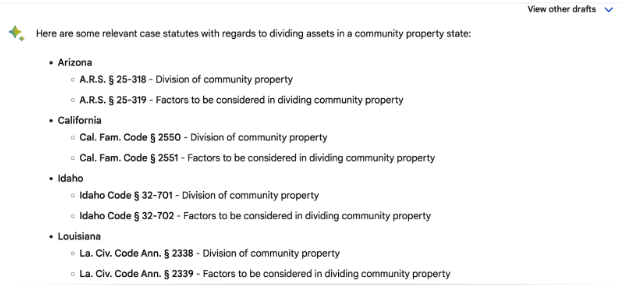
There’s lots of discourse about how AI is going to change the way humans work, and many people are predicting that the legal industry is one of the first spaces it could truly disrupt. Here’s what we know so far, from how it will help you to the potential risks–and how you can prepare to make the most of it.
First, a quick definition of AI
For those unfamiliar, AI stands for “artificial intelligence.” When we asked an AI model to describe exactly what it was, it generated this definition: “AI is the ability of machines to perform tasks that are typically associated with human intelligence, such as learning and problem-solving.”
There are a number of different types of AI, but the two most likely to affect the legal industry are predictive AI and generative AI. Predictive AI makes predictions about future events by analyzing past ones, while generative AI creates content. When used together, these models have the power to change the way lawyers approach their work. Here are the key parts of the legal profession that AI is primed to disrupt.
Contract review
Reviewing contracts is a significant and time-consuming aspect of practicing law–and one that AI is set to make much easier. Both predictive and generative models can assist in making the contract review process both more precise and efficient.
Lawyers can use predictive AI to review contracts and flag potentially problematic language (which can help you avoid mistakes that may cost significant amounts of both time and money). Additionally, some lawyers are already using AI-powered contract comparison tools , wherein AI reviews multiple contracts at once to help pull out trends and insights. Finally, AI can generate contract summaries, meaning it can scan a contract in seconds and provide a concise synopsis of its contents. This is not only helpful for you, as a lawyer, but also for your clients. If they need help understanding legal jargon, AI is able to translate many terms you might understand intuitively–but that are confusing to them–into plain English.
Time-consuming research
As a lawyer, research is a crucial and rewarding part of your job. However, there’s a ton of information out there, and it’s easy to get overwhelmed. As a tool programmed to synthesize vast amounts of information within seconds, AI can present you with facts and resources relevant to your research almost immediately; saving you hours.
For example, if you’re a family lawyer, and you’re looking for information on division of assets in a community property state, you can simply input “relevant case statutes with regards to dividing assets in community property states” into an AI tool. Within seconds, the tool will generate relevant statutes by state.

From there, let’s say you’re a family lawyer in California. You can then search for “scenarios in which community property has been divided in California” and AI will generate relevant cases that you can use as jumping off points for additional research.

Strategy, eventually
While AI isn’t strategizing on lawyers’ behalves yet, things might change in that area, too. The Brookings Institute predicted that lawyers may start using AI for strategic purposes–suggesting there’s a possibility AI could someday “analyze trial transcripts in real-time and provide input to attorneys to help them choose questions to ask witnesses.”
If this worries you, let’s take a moment to remember that AI is conversational and in no way equipped to provide legal advice at the present moment. And it’s also comforting to see that it doesn’t even try. Here’s what happened when we asked Bard to help out with legal strategy.

What are the risks of AI in the legal profession?
There are a couple of risks associated with introducing AI into the legal profession. The first is a concern that’s always been at the forefront of lawyer’s minds: client confidentiality. A Law.com report explains that many AI tools state plainly in their terms that inputting data into them waives your right to confidentiality. If you use ChatGPT, Bard, or another AI platform to analyze contracts or review your data, you must first obtain your client’s consent–which may be a significant hurdle.
There’s no such thing as AI-client privilege, and this could mean accidental exposure of client information. Additionally, AI is not subject to ethical standards and the algorithms that power it are built by humans and can be biased. This means relying on AI entirely for research could lead to uneven or unfair outcomes in certain cases.
Should we be afraid of AI?
If reading this is starting to make you a bit nervous about your own job security, let us assuage your fears: AI is here to make your life easier, not to take your job. If you’re not convinced, maybe hearing it directly from the source will help. We asked Google’s AI tool Bard why lawyers will remain valuable, and here’s what it had to say.
Here are some of the reasons why lawyers will still be valuable even with the advent of AI:
- Human judgment. Lawyers need to be able to think critically and apply the law to the facts of each case. AI can be a valuable tool, but it cannot replace the human element of the legal profession.
- Creativity. AI can be used to help lawyers with research and analysis, but it cannot replace the human ability to think outside the box.
- Communication. AI can be used to help lawyers with drafting documents and preparing presentations, but it cannot replace the human ability to build relationships and persuade others.
- Ethics. AI cannot replace the human commitment to upholding the highest ethical standards.
So, there you have it. Even AI itself knows that a lawyer’s job is irreplaceable. With that said, it is inevitable that the shape of the legal industry will change, so staying educated on how you can use AI to power your practice–instead of avoiding information on it for fear it will spell the end of your career–is the best way to move forward.
If you’re not quite ready to embrace AI, but are still looking to outsource some of your admin work, reach out to Marble, where we take time-consuming admin work off lawyers’ plates so they can focus on what truly matters: practicing law.
